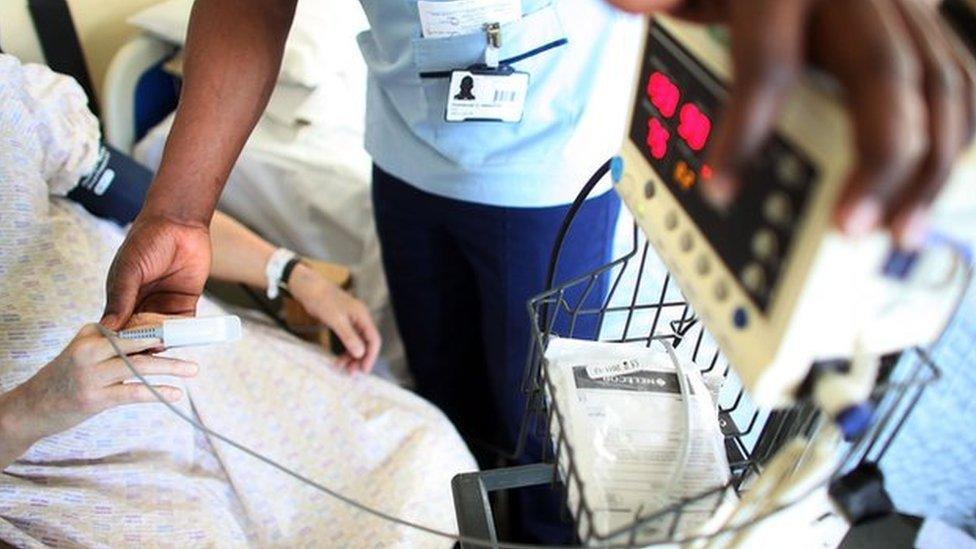Royal College of Surgeons warns of cancelled ops 'norm'
- Published

Cancelled operations due to winter pressures in hospitals are becoming "the norm" not the exception in Wales, a leading surgeon has warned.
Tim Havard, of the Royal College of Surgeons, said Wales is braced for a repeat of last winter's high demand, which was the busiest he had known.
Numbers of postponed operations rose to 84,477 in 2015/16, new figures show.
There has also been a jump in patients not turning up or postponing their own surgery at short notice.
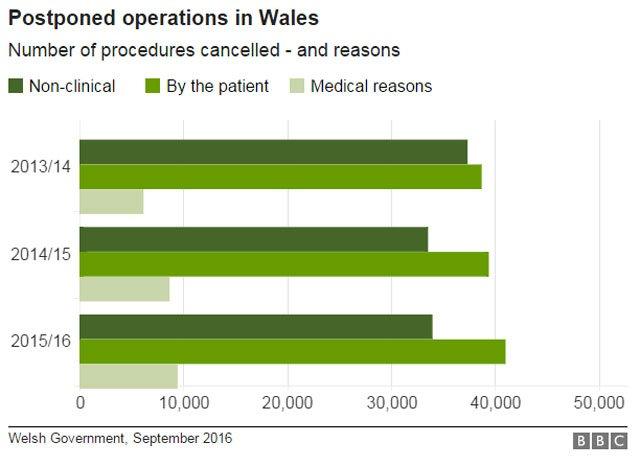
The proportion of planned operations cancelled for non-medical reasons - such as beds not being available - has fallen (40.2%).
But those as a result of patients cancelling or not turning up to their appointment has risen to 41,031 (48.6%).
The rest (11%) are due to surgery being cancelled for medical reasons such as the patient not being fit enough.
The previously unpublished figures show with more than a third of a million new routine surgery cases in Wales last year, patients have a one in four chance of the operation being cancelled for one reason or another.
A Welsh Government spokesman said: "While the health service needs to do more to prevent non-clinical postponements, we want to create a shared responsibility NHS where people attend their appointments and let the NHS know as soon as possible if a procedure is no longer needed so their space can be re-allocated to another person who needs treatment."
Conservative health spokeswoman Angela Burns AM said it was the "height of selfishness" and unacceptable for those patients who simply did not turn up on the day.
"However, I don't like the Welsh Government's attitude putting the emphasis all down to patients, it's a logistics problem we've had for years and we should be able to solve it by now."
Tim Havard said they were "constantly running to keep up" and solving the problem might need difficult decisions
Mr Havard, a consultant surgeon in Cardiff, said last winter was "extraordinarily difficult in terms of emergency pressures" and the most difficult he could remember, with the knock-on effect still being felt in June.
He said the lack of capacity to manage routine surgery was the biggest symptom and led to a large number of cancellations.
There was also a rise in demand from patients in their 80s and 90s being admitted to hospital.
"I cannot be confident we're not going to have more winter pressures this year," he said.
"It's difficult to predict but I don't see anything that is radically different from last winter. We're under pressure at the moment - at the end of September.
"We are functioning in terms of our elective operations but more pressure will mean it is likely we will run into similar problems this winter."
He said in terms of a long term fix there either needed to be more capacity or "difficult decisions" such as splitting work between hospitals in areas - so one does emergency services while the other does routine surgery.
"In the past we used to cancel elective operations just in extremis, when we had particular pressures, and that was unusual.
"I think that's become more the norm and we use it as the pressure outlet."

CASE STUDY: PATIENT WAITING FOR A HERNIA OPERATION
Christine Perkins, from Swansea, is hoping for a hernia operation in November after her surgery was cancelled over the summer
Christine Perkins, 72, from Waunarlwydd, Swansea, first went to her doctor in April 2014 when she found a lump and thought it was the recurrence of cancer but a hernia was diagnosed.
She was referred to a specialist at Neath Port Talbot Hospital and by the October she expected to wait four or five months for hernia surgery.
The operation was finally scheduled for July 2016 but was cancelled.
Mrs Perkins is now hoping it will go ahead in November but the hernia has grown and she has had to stop taking infusions for her arthritis, which is adding to her discomfort.
"I feel so tired, I can't sleep for the pain - the quality of life has gone," she said.
"It's going to cost the NHS a lot of money now - they've got to put a large mesh in now, which is hundreds of pounds. And where it would have been an overnight stay, now I've been told it's seven to 10 days."

CASE STUDY: ANEURIN BEVAN HEALTH BOARD
A snapshot of figures just for the Aneurin Bevan University Health Board area - which includes the Royal Gwent Hospital in Newport and the Nevill Hall Hospital in Abergavenny - shows more than 3,500 operations were cancelled by the hospitals within three days of the appointment in 2015/16, including more than 2,000 on the day of the procedure itself.
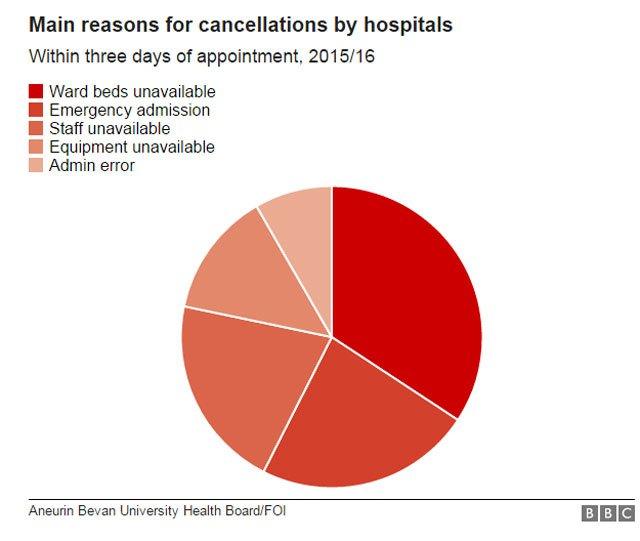
Around 30% were cancelled because ward beds were unavailable
20% were cancelled due to emergency admissions
18% were cancelled because staff were not available and just under 12% because equipment was unavailable
The figures - from a Freedom of Information request to health boards across England and Wales by the BBC - do not include outpatient procedures.
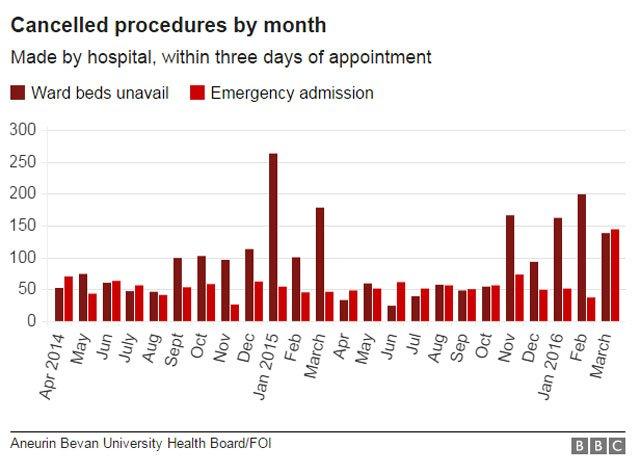
The peak months for cancelled operations because ward beds were unavailable coincided with winter pressures - and this was the same over a three year period.
Cancellations because of emergency admissions though are consistent throughout the year, although they peaked in March of this year, which was higher than the total for the previous three months combined.
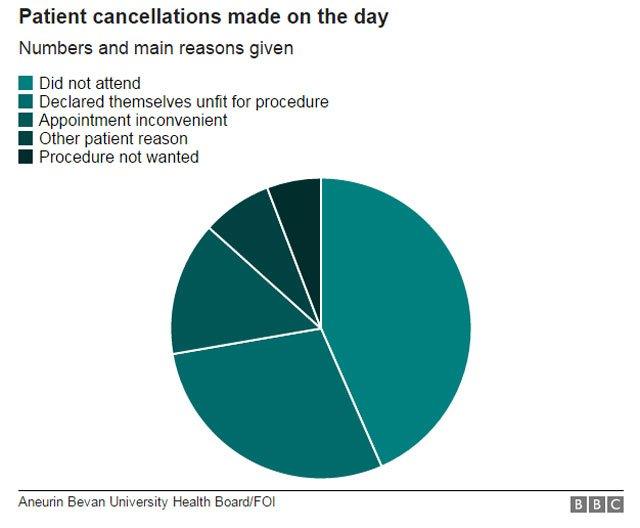
When we look at operations which were cancelled because of the patients themselves - these are even higher, more than 5,100 within three days of the scheduled procedure in 2015/16.
A third of these were because the patient declared themselves unfit for the operation
But 28% - more than 1,400 cancellations - were because the patient did not attend on the day
Another 21% were cancelled within three days by the patient because the appointment was "inconvenient". Just under half of these were made on the day of the procedure
The pattern is broadly similar over a three-year period - with around 13 procedures a day in this health board area alone being cancelled within three days of the appointment due to patients.
The Aneurin Bevan health board said its numbers of cancelled operations were reducing due to better management of patient bookings.
"When our hospitals are under increased pressure, we try to book in day case patients who don't need a bed," said a spokesman.
"We have also moved a proportion of our elective surgery to Ysbyty Ystrad Fawr in Ystrad Mynach, which is much less susceptible to cancellations due to the hospital having a greater flexibility with how beds are used."
But the spokesman said the figures clearly showed a large proportion of cancelled operations were down to circumstances "beyond our control".
"We would urge our patients to ensure they attend appointments, or if they need to cancel to let us know at the earliest opportunity so their space can be re-allocated to another person who needs treatment," he added.

Plaid Cymru health spokesman Rhun ap Iorwerth said cancellations because of lack of beds, staff and problems with equipment were problems that the Welsh Government "had to get to grips with."
But he also said people had to "understand the consequences for their actions if they don't turn up for their operations."
He said alongside education, there needed to be better communication between the NHS and the patient so they realised the importance of their treatment and the details of when it was to take place.
Health Secretary Vaughan Gething, who attended a winter planning meeting on Wednesday, said everyone could play a part in reducing pressures.
"If you are eligible for a free flu vaccine, it's worth making plans to get it soon so you are protected throughout the autumn and winter this year," he said.
"If you do get sick and need medical attention, take a look at the Choose Well website , externaland app that explain what each NHS service does.
"In many cases people go to emergency units when they could receive advice, be seen and assessed in a minor injuries unit, GP surgery or a pharmacy."
- Published22 September 2016

- Published10 March 2016
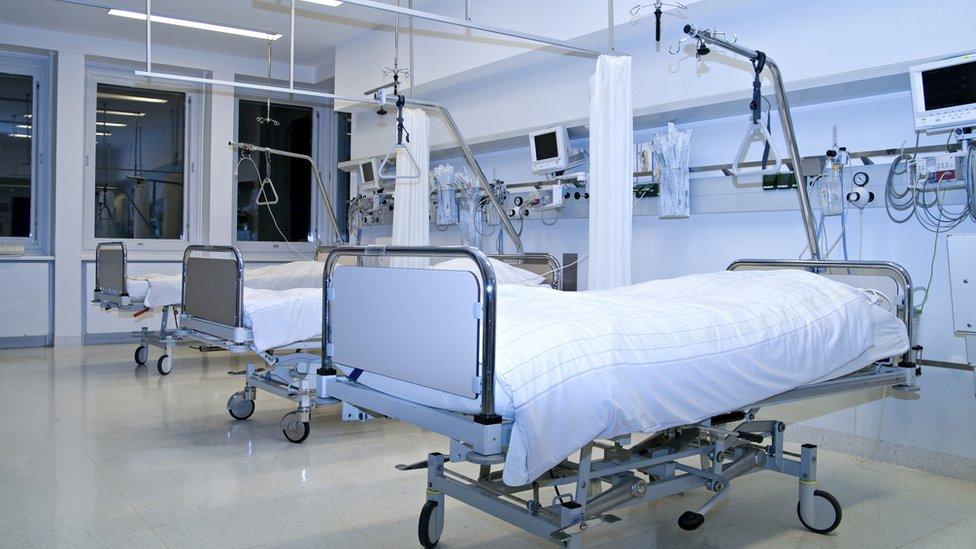
- Published28 January 2016
